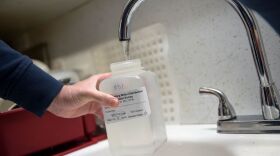Yet another Michigan city is dealing with the issue of lead in tap water, as Highland Park officials announced on Wednesday that the results of state-mandated testing put them in violation of a new, tougher Lead and Copper Rule.
Highland Park is a small city entirely within Detroit’s borders, with only 2,400 residential water customers. It tested water in 36 homes this past month. Nine of those homes came back with lead levels higher than the federal action level of 15 parts per billion (ppb).
The Michigan Department of the Environment, Great Lakes and Energy (EGLE) determines whether a city is in compliance based on the 90th percentile of all water samples. Highland Park’s 90th percentile was 57 ppb, well above the action level.
The city’s last round of testing, in 2016, did not find any problems. However, Highland Park only tested five homes with lead service lines that year. Michigan cities are now required to do more stringent and frequent water testing in the wake of the Flint water crisis, and state regulators have anticipated that would result in more communities finding higher levels of lead.
Highland Park water director Damon Garrett says the city will conduct free water testing for any resident who requests it, and start passing out water filters at its fire station starting on Thursday. He advised residents to take precautions by flushing their taps for five minutes before drinking the water.
“We have no reason to believe that we are in a state of emergency. But we do know that we are ultra-sensitive to this issue, so we want to make sure we’re communicating properly with everyone. but we still want to be calm about this,” Garrett says.
Garrett says Highland Park’s water infrastructure is about 100 years old, and the vast majority of homes have lead service lines. The city has begun replacing them, and expects to cover up to 15% of the city by fall 2020. He pegs the cost of replacing all those lead lines at $22 million, or roughly $5,000-$9,000 per household—a crushing amount for a city where at least half of all residents live in poverty, and one in seven children had elevated blood lead levels in 2016.
The city is applying for a $100 million loan from EGLE to cover that cost, along with other needed infrastructure repairs. But that cost would eventually be passed along to ratepayers.
Highland Park has been struggling with water issues for years. The city was forced to shut down its own water treatment plant in 2012, and turned to Detroit as its water supplier. But it failed to bill customers for a time during that transition, resulting in astronomical bills for customers once billing resumed again. Highland Park now gets its water from the Great Lakes Water Authority, which took over as the regional water supplier after Detroit’s bankruptcy.
The presence of lead is a new, unwelcome twist. Mayor Hubert Yopp says the state needs to step up and provide Highland Park with more resources.
“We’ll have to put pressure on the state,” Yopp says. “We will not sit by and become a Flint.”
The state will assist Highland Park with additional steps that are now triggered under state law, says EGLE spokesman Scott Dean. “We are also committed to assisting communities in finding resources to complete lead service line replacement,” he says.
Dean says EGLE will also work with the Great Lakes Water Authority and the Michigan Department of Health and Human Services “to analyze the data and determine the root cause of the [lead] exceedance.”
“A major step will be evaluating the efficacy of their corrosion control which is provided by GLWA,” Dean says. “We will also work with GLWA to see if we can help them improve corrosion control.”
Corrosion control is a chemical treatment process that is meant to prevent water from corroding pipes and leaching lead into water (the lack of corrosion control in Flint led to that city's water contamination).
In a statement, GLWA says it has “demonstrated continuous compliance with our State approved plan” for corrosion control. It adds that new testing protocols required under the revised Lead and Copper Rule require an additional sample of water that has remained static in lead service lines for a minimum of six hours, and notes that for some water systems, “the results could mean higher lead and copper numbers than seen in prior sampling protocols.”
“It is important to note that GLWA has water of unquestionable quality,” the statement continues. “As the provider of water treatment in southeast Michigan, GLWA remains committed to surpassing/overachieving all regulatory standards. Further, GLWA tests its water multiple times each day, significantly exceeding state/federal regulatory requirements.”






